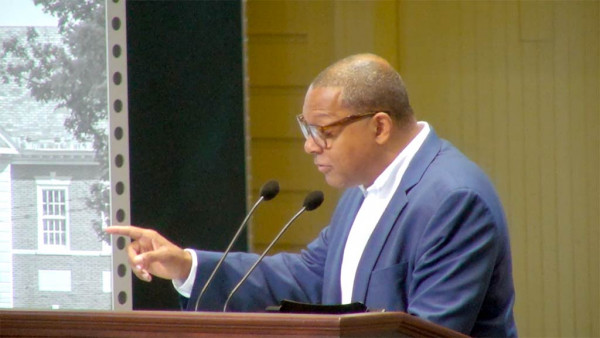World-Renowned Trumpeter Wynton Marsalis to Lecture on Society, Culture and History
During most performances with the Jazz at Lincoln Center Orchestra, trombonist Chris Crenshaw sits right in front of the organization’s managing and artistic director, nine-time Grammy Award-winning trumpeter and composer Wynton Marsalis.
“I always tell people that I have the best seat in the house,” Crenshaw said.
Although snagging even front row Amphitheater seats is a far cry from playing in the world’s preeminent jazz orchestra, Chautauquans will have the chance to replicate a sliver of Crenshaw’s intimate experience in the final week of Chautauqua’s 2019 season, “Exploring Race and Culture in America with Wynton Marsalis and Jazz at Lincoln Center,” featuring Marsalis and the program he co-founded in 1987. At 10:45 a.m. Monday, August 19 in the Amphitheater, Marsalis — an educator and American culture advocate — will deliver a lecture that marks the beginning of a week encompassing the second-ever performance of “The Ever Fonky Lowdown,” as well as a Friday morning Amp conversation to bookend the week. Today, Marsalis will share his insights about the state of society through a historical lens.
Matt Ewalt, vice president and Emily and Richard Smucker Chair for Education, expressed gratitude for Marsalis’ “leadership and partnership in convening this important conversation.”
“It’s a conversation that brings together the arts, education and religion at Chautauqua and demonstrates the power and potential of an interdisciplinary approach in addressing — together — our greatest challenges as a larger community,” Ewalt said.
From an early age, Marsalis performed music in the jazz-steeped city of his birth. At age 8, he played traditional New Orleans music in a band led by banjoist Danny Barker. When he was 14, he performed with the New Orleans Philharmonic; by the end of high school, he had played with the New Orleans Symphony Brass Quintet, New Orleans Community Concert Band, New Orleans Youth Orchestra and New Orleans Symphony.
At 17, he became the youngest musician ever admitted to Tanglewood Berkshire Music Center, and was awarded the school’s Harvey Shapiro Award for outstanding brass student. Studies at The Juilliard School followed, as did a recording contract with Columbia Records and the formation of his own touring band in 1981. Just 18 years after he first moved to New York City to pursue a professional career in music, Marsalis became the first jazz musician to win the Pulitzer Prize for Music.
“Anything a human being can conceive of or imagine, anything that has to do with human interaction, that has to do with creativity and creation, is in the province of jazz,” Marsalis told Charles Donelan in an interview for the Santa Barbara Independent. “It’s not possible to find a human thing without some connection to jazz, because that’s just how art forms are. Also, an art form that includes as many people as jazz — where to participate all you have to do is learn how to play an instrument — that’s a situation where you’re going to have a lot of different people involved.”
Marsalis also reflected on his work with Jazz at Lincoln Center during the interview.
“There’s no way I could have known we were going to do all that when we started,” he told Donelan. “There were so many people working in so many ways to realize this dream. I was only one part of it.”
Trombonist Crenshaw described Marsalis as having “a way with explaining how he wants the band to sound like,” a leader who meets high expectations with an all-inclusive attitude.
“We all can have input,” Crenshaw said. “We all feed off each other, but we’re keen to his vision.”

